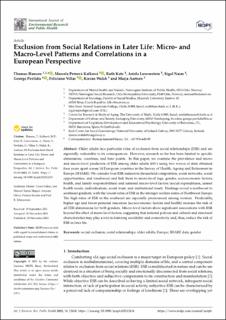| dc.contributor.author | Hansen, Thomas | |
| dc.contributor.author | Kafková, Marcela Petrová | |
| dc.contributor.author | Katz, Ruth | |
| dc.contributor.author | Lowenstein, Ariela | |
| dc.contributor.author | Naim, Sigal | |
| dc.contributor.author | Pavlidis, George | |
| dc.contributor.author | Villar, Feliciano | |
| dc.contributor.author | Walsh, Kieran | |
| dc.contributor.author | Aartsen, Marja | |
| dc.date.accessioned | 2021-12-21T14:41:01Z | |
| dc.date.available | 2021-12-21T14:41:01Z | |
| dc.date.created | 2021-12-02T06:45:54Z | |
| dc.date.issued | 2021-11-25 | |
| dc.identifier.issn | 1660-4601 | |
| dc.identifier.uri | https://hdl.handle.net/11250/2835281 | |
| dc.description.abstract | Older adults face particular risks of exclusion from social relationships (ESR) and are especially vulnerable to its consequences. However, research so far has been limited to specific dimensions, countries, and time points. In this paper, we examine the prevalence and micro-and macro-level predictors of ESR among older adults (60+) using two waves of data obtained four years apart across 14 European countries in the Survey of Health, Ageing and Retirement in Europe (SHARE). We consider four ESR indicators (household composition, social networks, social opportunities, and loneliness) and link them to micro-level (age, gender, socioeconomic factors, health, and family responsibilities) and national macro-level factors (social expenditures, unmet health needs, individualism, social trust, and institutional trust). Findings reveal a northwest to southeast gradient, with the lowest rates of ESR in the stronger welfare states of Northwest Europe. The high rates of ESR in the southeast are especially pronounced among women. Predictably, higher age and fewer personal resources (socioeconomic factors and health) increase the risk of all ESR dimensions for both genders. Macro-level factors show significant associations with ESR beyond the effect of micro-level factors, suggesting that national policies and cultural and structural characteristics may play a role in fostering sociability and connectivity and, thus, reduce the risk of ESR in later life. | en_US |
| dc.description.sponsorship | GENPATH is part of the GENDER-NET Plus ERANET COFUND project, which has received funding from the European Union’s Horizon 2020 research and innovation programme under grant agreement N° 741874. The national teams have been supported by following grants: Austria (FWF I4210/GNP187), Czechia (TAČR ZÉTA TJ03000002), Israel (Ministry of Science, Technology and Space N° 3-15667), Ireland (GNP-187), Norway (NFR 299859), Spain (PCI2019-103627), Sweden (Vetenskapsrådet 2018-00929). Support also comes from the Norwegian Research Council through the research project “Eurocare” (grant no. 327659). | en_US |
| dc.language.iso | eng | en_US |
| dc.publisher | MDPI | en_US |
| dc.relation.ispartofseries | International Journal of Environmental Research and Public Health (IJERPH);Volume 18, Issue 23 | |
| dc.rights | Navngivelse 4.0 Internasjonal | * |
| dc.rights.uri | http://creativecommons.org/licenses/by/4.0/deed.no | * |
| dc.subject | Social exclusions | en_US |
| dc.subject | Social relationships | en_US |
| dc.subject | Older adults | en_US |
| dc.subject | Europe | en_US |
| dc.subject | Survey of Health, Ageing and Retirement in Europe data | en_US |
| dc.subject | Genders | en_US |
| dc.title | Exclusion from Social Relations in Later Life: Micro- and Macro-Level Patterns and Correlations in a European Perspective | en_US |
| dc.type | Peer reviewed | en_US |
| dc.type | Journal article | en_US |
| dc.description.version | publishedVersion | en_US |
| dc.rights.holder | © 2021 by the authors. | en_US |
| cristin.ispublished | true | |
| cristin.fulltext | original | |
| cristin.qualitycode | 1 | |
| dc.identifier.doi | https://doi.org/10.3390/ijerph182312418 | |
| dc.identifier.cristin | 1963075 | |
| dc.source.journal | International Journal of Environmental Research and Public Health (IJERPH) | en_US |
| dc.source.volume | 18 | en_US |
| dc.source.issue | 23 | en_US |
| dc.source.pagenumber | 1-16 | en_US |
| dc.relation.project | Norges forskningsråd: 299859 | en_US |

